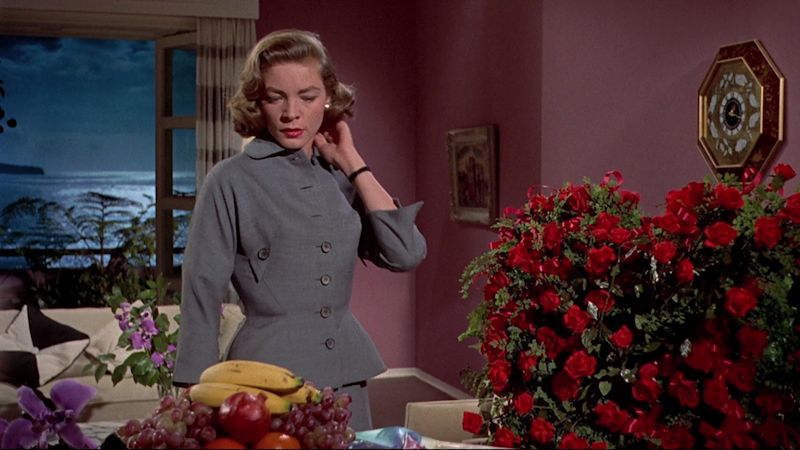There’s something paradoxical about a film shot in Technicolor. On one hand, its brilliance is inviting. We can’t take our eyes off of it, yet we know we’re drawn into the mysterious, dangerous, and often deviant lives of others. We become voyeurs of drama, peering into the private lives, knowing on some subconscious level that we ought to look away.
Douglas Sirk’s Written on the Wind (1956) is a fine example of that melodramatic Technicolor brilliance. The story centers around the Hadleys, a wealthy oil family, and their self-induced misfortunes. Robert Stack plays Kyle Hadley, an heir to the family’s oil business, a playboy and an alcoholic, who hardly works. Flying 2000 miles to get a good steak sandwich is part of his routine. Excess is his modus operandi, and given his economic and social status, he’s convinced that anything is for sale and obtainable, including people.
Rock Hudson plays Mitch Wayne, Kyle’s best friend, and the one who does the actual work for Kyle’s father’s company. He’s steady, wise, and stoic. He gets mad, but Mitch keeps those emotions in balance. Logic and reason always take precedence over self-interest or passion.
Two men and one woman always spell disaster. Enter Lucy Moore (Lauren Bacall), an executive secretary at Hadley Oil Company’s New York office. At first, she meets Mitch, who invites her to lunch. He’s interested in her but Kyle decides to join them, and this seals the marriage between Lucy and Kyle.
Lucy doesn’t accept the fast proposal immediately. Kyle whisks her away on a trip to Miami, securing a hotel suite, filled with flowers, dresses, and jewelry. She’s initially impressed but the amazement quickly turns into disgust at the excess and opulence Kyle has dumped into the suite. His emotional immaturity and a complete lack of understanding of women (at least the kind of woman Lucy is) are on full display. He’s a fool, yet Lucy sees something beyond that emotional idiocy.
Sirk shows the finality of tragedy in the film’s opening. There’s no mystery about the fact that Kyle is driving drunk to the family’s home, angry and exhausted. We don’t know why yet but we do know that once he’s in the house, the shots are fired, and a figure that looks like him is bleeding, barely exiting the house, until finally unceremoniously falling on the ground.
There’s no doubt that Written on the Wind is a social critique of America’s wealthy class. Sirk has said this many times. The excess of melodrama and Technicolor adds to the absurdity and ostentatiousness of events brought on mainly by Kyle’s inability to see himself honestly in the mirror.
But Sirk hasn’t made a simple political or economic statement with the film. At the core of it, human emotions and archetypes take the center of this Technicolor stage.
Resentment and jealousy drive Kyle, as well as his sister, Marylee (Dorothy Malone). There are competing masculinities at play as well. Stack’s Kyle is a man with emotional needs of a petulant child. His masculinity is perpetually directed outwardly. He’s inwardly persecuted and when he finds out that the reason Lucy is unable to get pregnant immediately because of his own medical condition, he begins to feel inadequate. After Lucy joyfully tells him that she’s pregnant, his interior inadequacy turns to rage because he assumes that the legitimate father of Lucy’s baby is Mitch. This turns out to be untrue, and it further cements Kyle’s fate.
Mitch’s masculine strength is derived from stoic silence. Throughout the film, he’s a man of honor, and like a big brother, continuously protects Kyle from danger, including from Kyle himself. Mitch is always deliberating, and then acts on this reflection. Even his eventual declaration of love for Lucy is an event supported by his measured and moderated soul.
Malone’s performance as Marylee leaves one breathless. She’s at once a sexual object and a complete mess. Getting drunk and sleeping with random men (one of them is Biff Miley played by the wonderful Grant Williams of the 1957’s The Incredible Shrinking Man) is her idea of activity, extracurricular and otherwise.
Malone’s platinum blonde hair, overpainted lips, and drunk disheveledness add to the over-the-top plunge into the abyss. In one scene, Marylee’s dancing in her room. It is as if she’s performing some kind of violent, voodoo ritual, in and out of body. Sirk’s juxtaposition of the dance of desperate solitude with her father’s death on the grand staircase is so shocking and disturbing that the only emotion one can muster is pure anger at the uselessness of Marylee as a human being. Despite her very self, Marylee reaches out into the depths of her being and finds a small shred of goodness and honor when her testimony exonerates Mitch from alleged murder of Kyle.
The final scene shows Mitch and Lucy riding/driving into the sunset. Will these new lovers be happy together? Perhaps, but I think that the bigger question pertains to Marylee’s life. She may be a supporting character in this family melodrama but the gravity of her being is far greater than that of others. In the penultimate scene of the film, she’s sitting at her father’s desk, clutching a model of oil derrick, not knowing whether to caress it or destroy it. She’s now truly alone. The naked, unbearable weight of desperate solitude has finally arrived.

